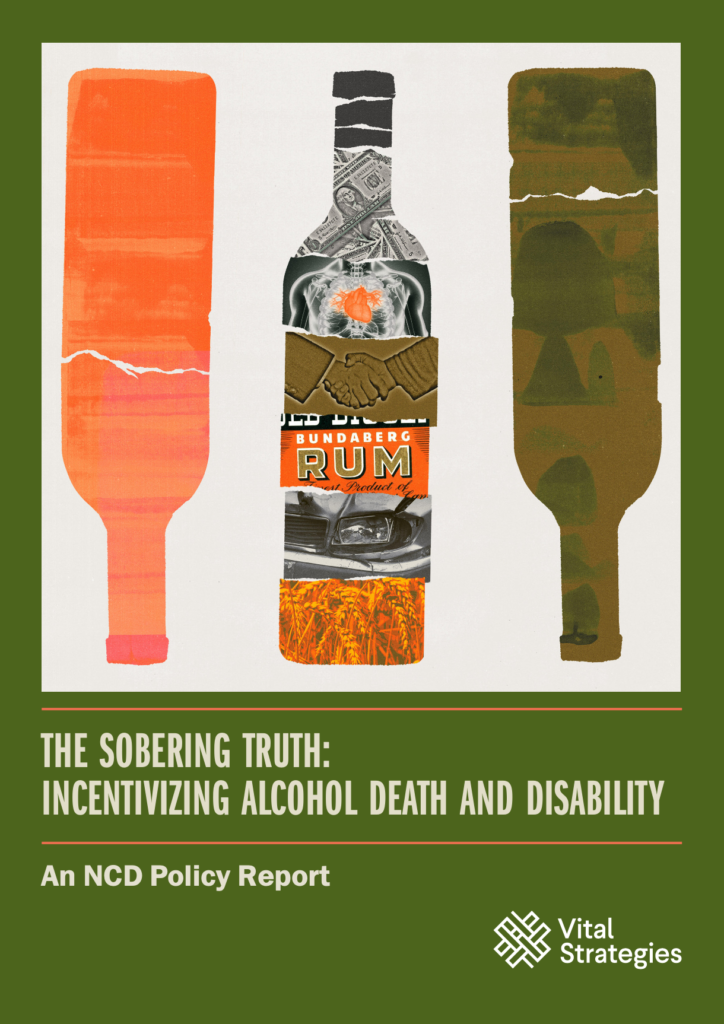The new report by Vital Strategies titled “The Sobering Truth: Incentivizing Alcohol Death and Disability” exposes how governments and global development agencies incentivize alcohol death and disability and how the alcohol industry interferes with public health policy.
- Alcohol use causes one death every 10 seconds around the world.
- It is a leading risk factor for non-communicable diseases (NCDs) such as cardiovascular disease, liver disease and a variety of cancers.
- Alcohol harms the health, social and economic state and development of countries. This harm is unequal and affects low and middle income countries (LMIC) proportionately more.
The report examined publicly available data and found that despite the heavy alcohol burden, high-level global development agencies do incentivize countries to give financial breaks to the alcohol industry under the guise of development assistance. LMICs are specifically affected by this perverse strategy. These incentives include tax breaks, tax rebates, production subsidies, international trade agreement practices and even marketing subsidies.
Key findings of the report
Governments and development agencies give incentives to the alcohol industry such as development assistance, tax breaks, marketing deductions, tax rebates and production subsidies, as well as incentives in the form of international trade agreement practices.
- Between 1995 and 2020, governments and development agencies provided significant financial incentives to the alcohol industry in countries across the world.
- Incentives are commonly disbursed from high-income countries to transnational alcohol corporations producing and selling in low- and middle-income countries.
- Most of the incentives come from the European Union, United Kingdom, and United States, and go to countries in Africa, Central and Eastern Europe, and the Caribbean.
- Taxpayer-funded support for the expansion of the alcohol industry creates a triple burden for countries:
- lost revenue,
- increased alcohol consumption, and
- overwhelmed public health systems, particularly in low- and middle-income countries with lower health protections and higher alcohol-attributable deaths.
Most incentives offered to the alcohol industry flow as development assistance from governments in higher-income countries to low- and middle-income countries. The vast majority of beneficiaries turn out to be big alcohol corporations—headquartered in high-income countries.
- FIFA, the international governing body for football, requires a World Cup host country to waive taxes on any profits made by FIFA’s commercial partners, including AB InBev. As host of the 2014 FIFA World Cup, Brazil gave a total of US $475 million between 2011 and 2015 in tax breaks to FIFA and its commercial partners. AB InBev reportedly pays anything between $10m and $25m a year to be World Cup sponsor – obviously a great deal for the beer giant. For countries and their societies, however, the story is different: for instance, South Africa lost more than $2.5 billion on hosting the World Cup in 2010.
- The top 10 alcohol producers in 2017 alone were exempted from paying taxes on US $1.5 billion for beer advertising.
- In 2012 alone, the U.S. federal government provided US $230 million in tax rebates to Bacardi in Puerto Rico and more than US $199 million to Diageo in the U.S. Virgin Islands.
- In 2009, SABMiller, now merged with AB InBev, issued lawsuits against Andhra Pradesh, India to reverse the states alcohol pricing policy. The U.K. government worked closely with SABMiller and local authorities to remove pricing regulations on beer, worth more than US $80 million in sales to the company.
This type of incentivizing to the alcohol industry is perverse, as the industry is responsible for a large burden of death and disability. It is also counter-productive and incoherent with global development goals to promote profits and expansion of a health harmful industry whose products and practices fuel health, social and economic harm in countries around the world.
The alcohol industry in turn intentionally, purposefully and usually aggressively interferes with national and global public health policy making which could reduce consumption and thus would threaten their profits.
How can we square off the benefit of development assistance with the loss of 3 million lives a year and a long-term destruction of health and mental well-being?” questions the report by Vital Strategies.
How can we justify the benefit of development assistance when the vast majority of beneficiaries of incentives turn out to be multinational alcohol corporations from high-income countries?”
The Sobering Truth: Incentivizing Alcohol Death and Disability by Vital Strategies
The report points out that government action so far has been inefficient in adopting evidence based strategies to prevent and reduce alcohol harm such as the World Health Organization’s SAFER technical package.
Key actions proposed by the report
The report urges governments, policymakers and health advocates to actively monitor the alcohol industry’s interference in public policy-making and to question the cost and benefits of economic incentives. The report proposes that governments and the development community reexamine current economic incentives to the alcohol industry and advocate for consistent policies that promote health. A sustainable development agenda should:
- Use fiscal policies to reduce availability of alcohol and direct available finances to strengthen health systems.
- Phase out incentives that can be harmful to health.
- Calculate the health cost of incentives provided to the alcohol industry.
- Monitor investments made to the alcohol industry through robust data collection and by tracking each investment’s overall impact.
- Avoid alcohol industry interference.
- Track the adaptation of alcohol industry behavior and corporate actions during and after crises and shocks.

